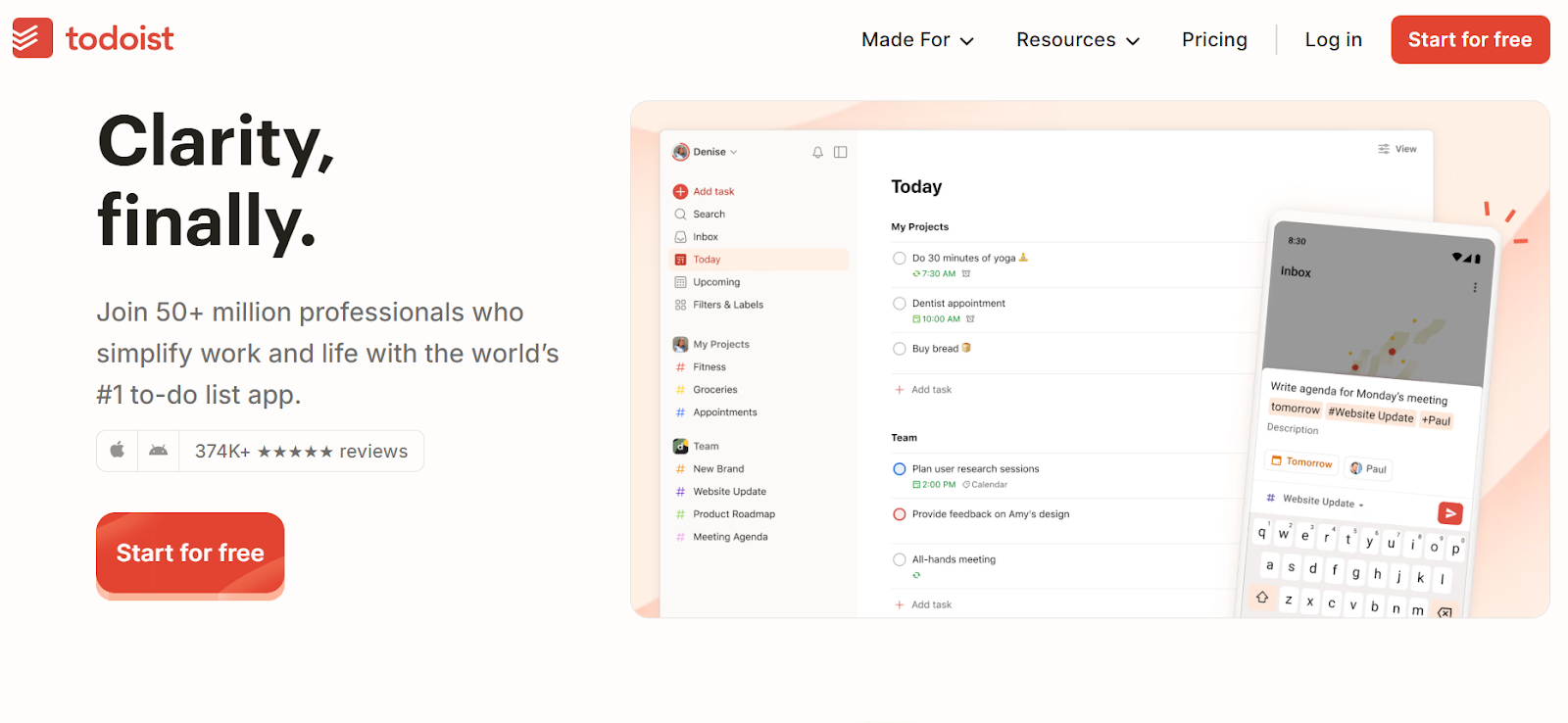Managing time efficiently is hard enough; finding the right tool to help you do it shouldn't be harder. Motion, the AI-powered time management app, is popular for automating schedules, booking meetings, and organizing daily tasks. Its smart auto-scheduling and calendar features make it appealing. But while Motion handles planning well, it falls short when it comes to managing actual project execution. Its project management features are basic and may not meet the needs of growing teams or complex workflows. If you're searching for more capable Motion app alternatives, this list features 7 top options for 2025, covering both free and paid tools. Let’s break down how each one compares.
What Are the Limitations of Using Motion?

While AI-powered scheduling is the highlight of Motion, in practice, the app falls short for those seeking substantial project management capabilities.
1. Narrow Focus on Time-blocking: Motion's primary strength lies in its task scheduling. However, it cannot fully handle complex projects and deliverables, making it unsuitable for teams looking to manage projects beyond just time allocation.
2. Complicated Interface: For users who aren’t familiar with calendar-based dashboards, Motion can feel overwhelming. It’s not as intuitive as some users may expect.
3. Expensive: With its per-user pricing, Motion becomes costly, especially for teams looking to scale.
4. Limited Team Collaboration Features: The platform is lacking in advanced collaboration tools. While it allows file attachments and comments, it's not ideal for teams that need to communicate and collaborate in real time.
5. Limited Customization: You can tweak your views, but Motion lacks the flexibility to fully customize workflows or layouts to suit your needs.
If you're considering switching from Motion, it’s important to know what to look for in a replacement, especially if you want more than just smart scheduling.
Features to Consider When Choosing Motion App Alternatives

When evaluating alternatives to Motion, it’s essential to consider what you want to achieve with the tool, whether it’s automated scheduling or more hands-on project management. Here are some key features to keep in mind:
1. Intuitive and User-Friendly Interface: A simple and organized design is key to reducing the learning curve. Look for a platform that’s easy to use and doesn’t require an extensive setup or training period.
2. Comprehensive Project and Task Management: The tool you choose should not only handle scheduling but also provide robust project management features like task delegation, progress tracking, milestones, and reporting.
3. Calendar Integration: Ensure that the tool integrates smoothly with your existing calendar system, allowing for easy management of tasks, deadlines, and events in one place.
4. Smart Meeting Scheduling: Choose a tool that can automatically find the best meeting times based on everyone's availability, reducing back-and-forth and avoiding scheduling conflicts.
5. Team Collaboration Tools: Effective collaboration is crucial. Look for a solution that enables seamless communication and teamwork, eliminating the need to constantly switch between apps.
6. Integrations: Make sure the tool offers integrations with other software and platforms your team relies on. But, be mindful of any additional costs that may arise from using extra integrations.
Now that we’ve outlined the key features to consider, let’s take a look at some of the best alternatives to Motion in 2025.
Read: Enhance Project Efficiency with the Best AI Tools
7 Best Motion Alternatives for 2025
If Motion’s features don’t meet your needs, explore these top alternatives for 2025. From AI-driven scheduling to project management tools, find the perfect fit to enhance productivity and streamline workflows.
1. Clockwise

Clockwise is an AI-powered calendar assistant that goes beyond basic scheduling by optimizing your entire calendar. Unlike Motion, which primarily focuses on task management, Clockwise is designed to improve team productivity by scheduling meetings and holds with your whole team’s preferences in mind. It automatically adjusts your schedule, ensuring meetings are efficiently placed and that your time is used effectively throughout the day. Clockwise proactively reschedules meetings to optimize your workday, making it an ideal solution for teams looking to streamline their schedules and maximize productivity.
Key Features:
- AI-Powered Scheduling: Automatically finds time for last-minute or urgent meetings by rescheduling flexible appointments, optimizing your calendar and boosting productivity, unlike Motion’s task-only approach.
- Flexible Meeting Rescheduling: Automatically reschedules meetings, including one-on-ones, to the most efficient times based on your availability, providing more flexibility than Motion’s static task management system.
- Smart Scheduling Links: Allows external participants to schedule meetings at convenient times, streamlining scheduling for teams, unlike Motion, which focuses only on internal task management.
- Seamless Integrations: Integrates effortlessly with Google Calendar, Outlook, and Slack, ensuring your team stays aligned and your schedule is optimized across all platforms.
- Free: $0 per user/month
- Teams: $6.75 per user/month (billed annually)
- Business: $11.50 per user/month (billed annually)
- Enterprise: Custom pricing
2.Sunsama

Sunsama is a daily planner app that focuses on helping users reflect on their day and prioritize their tasks effectively. With its emphasis on mindfulness, Sunsama stands out by guiding users to block time thoughtfully, encouraging intentionality in daily planning.
Key Features:
- Time-blocking for tasks: Helps users allocate time for each task and stay on track.
- Integrations with Asana, Trello, Notion: Syncs with popular task management tools for seamless workflow.
- Reflective planning process: Encourages users to reflect on their past day and plan intentionally for the future.
Pricing:
- Monthly Plan: $20 per user
- Annual Plan: $16 per user/month (billed annually)
- Free Trial: 14-day trial available
3. Todoist

Todoist is a simple task management tool that helps users keep track of their to-dos and prioritize them. While it doesn't use AI, its straightforward features make it a go-to app for personal task management, making sure nothing falls through the cracks.
Key Features:
- Task creation and prioritization: Easily create tasks and assign priorities for clear focus.
- Simple, easy-to-use interface: Offers an intuitive interface that makes task management effortless.
- Filters for task organization: Customize views and filters to manage better and view tasks by priority or due date.
Pricing:
- Free Plan: $0 per user/month
- Pro Plan: $4 per user/month (billed annually) or $5 per user/month (billed monthly)
- Business Plan: $6 per user/month (billed annually) or $8 per user/month (billed monthly)
4. Trello

Trello is a highly visual tool that uses Kanban boards for task management. It’s ideal for teams and individuals who prefer visualizing workflows. Though lacking the automation found in Motion, Trello excels at fostering collaboration, making it a solid choice for teams.
Key Features:
- Drag-and-drop task management: Easily organize tasks using the board's drag-and-drop functionality.
- Kanban board style organization: Organizes tasks visually to streamline workflow management.
- Power-Ups for added functionality: Extend Trello's capabilities with integrations and features to fit your workflow.
Pricing:
- Free Plan: $0 per user/month
- Standard Plan: $5 per user/month (billed annually) or $6 per user/month (billed monthly)
- Premium Plan: $10 per user/month (billed annually) or $12.50 per user/month (billed monthly)
- Enterprise Plan: Starts at $17.50 per user/month (billed annually); pricing decreases with more users
5. Akiflow

Akiflow consolidates tasks from multiple apps into one central inbox, making it easier to organize and schedule tasks manually. While it lacks AI features, its simplicity in task management and time blocking makes it a great alternative for users who prefer control over automation.
Key Features:
- Centralized task inbox: Gather tasks from various apps into a single inbox for easy management.
- Integration with Gmail, Slack, Notion, and others: Syncs with popular tools to streamline your workflow.
- Manual time blocking and task management: Users can manually assign time slots to tasks for better control.
Pricing:
- Monthly Premium Plan: $24.99 per user/month
- Annual Premium Plan: $14.99 per user/month (billed annually)
- Believer Plan: $8.33 per user/month (billed every five years)
6. ProofHub

ProofHub is an all-in-one project management tool that offers task management alongside robust team collaboration features. It’s perfect for teams looking for a comprehensive solution that goes beyond scheduling, enabling seamless project execution with enhanced communication and organization.
Key Features:
- Task management, time tracking, and project timelines: Keep track of all tasks, milestones, and deadlines in one place.
- Built-in chat, file sharing, and real-time collaboration: Foster seamless communication and collaboration across teams.
- No per-user pricing: Enjoy a flat-rate pricing structure with no additional costs per user, making it cost-effective for scaling teams.
Pricing:
- Essential Plan: $45 per month (billed annually) or $50 per month (billed monthly)
- Ultimate Control Plan: $89 per month (billed annually) or $99 per month (billed monthly) for the first three months; then $135 per month (billed annually) or $150 per month (billed monthly)
7. Ellie Planner

Ellie Planner is an affordable task management tool designed for individuals who need to organize their daily tasks. While it's simple and light, it lacks advanced project management features, making it best for personal use or small projects.
Key Features:
- Timeboxing and recurring tasks: Set time blocks for tasks and schedule recurring activities for better planning.
- Simple and user-friendly interface: A clean interface that’s easy for new users to navigate.
- Google Calendar integration: Sync tasks with Google Calendar to keep everything aligned.
Pricing:
- Free Plan: $0 per user/month
- Pro Plan: $9.99 per user/month or a one-time payment of $299.99
Final Thoughts
While Motion excels at task management, it lacks the depth needed for project execution and effective team collaboration. If you're looking for a more comprehensive solution, Clockwise stands out as the best motion alternative. It not only optimizes your calendar with intelligent AI scheduling but also ensures that your meetings are organized efficiently, providing more flexibility than Motion. Clockwise enables real-time collaboration, integrates seamlessly with your team's workflow, and creates time where there previously was none.
Ready to optimize your schedule? Try Clockwise for free today and experience a smarter, more productive workday!


.gif)
.png)



